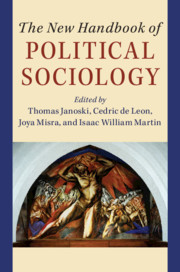Book contents
- The New Handbook of Political Sociology
- The New Handbook of Political Sociology
- Copyright page
- Dedication
- Contents
- Tables
- Figures
- Contributors
- Acknowledgments
- Introduction
- I Theories of Political Sociology
- II Media Explosion, Knowledge as Power, and Demographic Reversals
- III The State and Its Political Organizations
- 15 The Political Economy of the Capitalist State
- 16 States as Institutions
- 17 Nation-State Formation
- 18 The Political Sociology of Public Finance and the Fiscal Sociology of Politics
- 19 Politics, Institutions, and the Carceral State
- 20 The Political Sociology of Democracy
- 21 Revolutions against the State
- IV Civil Society: The Roots and Processes of Political Action
- V Established and New State Policies and Innovations
- VI Globalization and New and Bigger Sources of Power and Resistance
- Index
- References
21 - Revolutions against the State
from III - The State and Its Political Organizations
Published online by Cambridge University Press: 22 February 2020
- The New Handbook of Political Sociology
- The New Handbook of Political Sociology
- Copyright page
- Dedication
- Contents
- Tables
- Figures
- Contributors
- Acknowledgments
- Introduction
- I Theories of Political Sociology
- II Media Explosion, Knowledge as Power, and Demographic Reversals
- III The State and Its Political Organizations
- 15 The Political Economy of the Capitalist State
- 16 States as Institutions
- 17 Nation-State Formation
- 18 The Political Sociology of Public Finance and the Fiscal Sociology of Politics
- 19 Politics, Institutions, and the Carceral State
- 20 The Political Sociology of Democracy
- 21 Revolutions against the State
- IV Civil Society: The Roots and Processes of Political Action
- V Established and New State Policies and Innovations
- VI Globalization and New and Bigger Sources of Power and Resistance
- Index
- References
Summary
The way social scientists think that others think about revolutions has been shaped primarily by Jack Goldstone. In his influential review essays, Goldstone (1982, 2001) presents the twentieth-century study of revolution as occurring in generations – from natural historians of the 1930s to general theorists of the mid-twentieth century, from state-centered scholars in the 1980s to a contemporary fourth generation basket of approaches. Because it is so familiar, his reading animates nearly all contemporary literature reviews in revolution studies.
- Type
- Chapter
- Information
- The New Handbook of Political Sociology , pp. 564 - 592Publisher: Cambridge University PressPrint publication year: 2020
References
- 11
- Cited by

